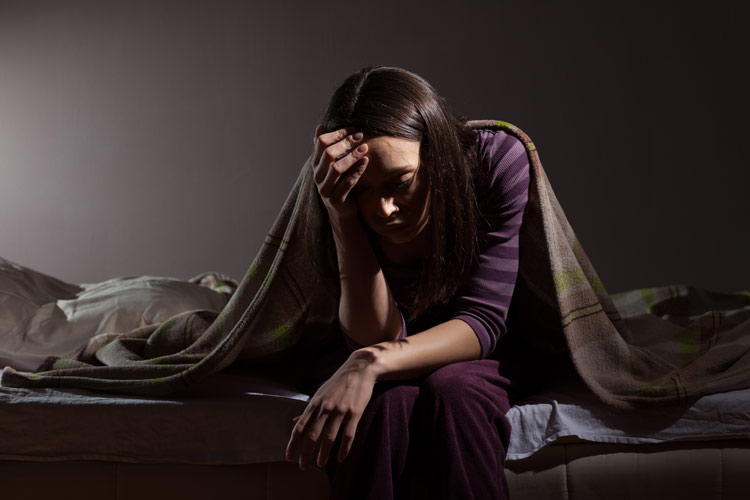 The average adult requires seven to nine hours of sleep each night, but meeting this target can be difficult if you’re in recovery for a substance use disorder.
The average adult requires seven to nine hours of sleep each night, but meeting this target can be difficult if you’re in recovery for a substance use disorder.
A study in the Journal of Addiction Medicine found that people in the early stages of recovery struggle with sleep problems at rates that are five times higher than that of the general population. This can include:
- Trouble falling asleep
- Tiredness during the day
- Waking up in the middle of the night
- Disturbing dreams
In addition to negatively affecting your quality of life, a lack of sleep can lead to a number of symptoms that can increase your risk of relapse. This includes:
- Depression
- Anxiety
- Irritability
- Poor impulse control
- Impaired problem-solving skills
6 Tips for Getting a Better Night’s Rest
One of the reasons why insomnia is so common in the early stages of recovery is that people with substance use disorders often get in the habit of relying on their addiction to help them sleep. For example, they may indulge in a nightcap before bed or alternate uppers and downers instead of committing to getting the rest they need.
Abusing drugs or alcohol also affects the body’s neurological systems that control sleep cycles. Your body will reset itself eventually, but there are several easy ways to promote healthy sleep habits in the meantime. For example:
1. Try to go to bed and get up at the same time each day.
It’s understandable to want to catch up on your sleep on the weekends, but this strategy can backfire. Sticking to a consistent schedule helps keep your biological clock on track. This includes avoiding daytime naps of more than 30 minutes.
2. Limit caffeine.
Caffeine should be avoided as much as possible in the early stages of recovery. It is a stimulant that can cause mood changes, making you more prone to relapse. If you must have a cup or two of coffee to get moving in the morning, make sure you avoid caffeine in the afternoon and evening hours. Caffeine takes about eight hours to leave your system.
3. Have a light snack.
About an hour before you want to go to bed, have a small snack that combines carbohydrates and either calcium or a protein that contains the amino acid tryptophan. This combination helps boost serotonin, which creates a more relaxed mood. Healthy snack options to consider include one medium banana with one teaspoon of peanut butter, a slice of whole grain toast with low-fat cheese or turkey, or a piece of fruit and a serving of low-fat yogurt.
4. Exercise.
Regular physical activity, even if it’s something as simple as going for a walk after lunch, helps promote more restful sleep by balancing the body’s circadian rhythms. However, you should avoid exercising three hours or less before you want to go to bed. Exercising late in the day can make it harder to sleep by overstimulating the body.
5. Make journaling a part of your nighttime routine.
Journaling in recovery provides a way to process emotions and document your progress towards lasting sobriety. It can also help you sleep better by giving you a way to work through worries that might otherwise keep you up at night. Set aside 10 to 20 minutes to write about whatever is on your mind. You don’t need to pay attention to spelling or grammar. In fact, you can simply jot down a quick list if the idea of writing long paragraphs feels too overwhelming.
6. Redecorate your bedroom.
Your bedroom doesn’t need to look like it was ripped from the pages of an interior design magazine, but a few minor tweaks can promote better sleep. Eliminate excess light sources that can interfere with the production of the sleep-inducing hormone melatonin. Keep electronics out of the area so you’re not tempted to stay up late watching TV or surfing online. Add a white noise machine or a fan to help block out the sound of loud neighbors, barking dogs, or other distractions that may keep you awake.
Normally, people fall asleep 10 to 20 minutes after going to bed. If you are still awake for more than 30 minutes after turning off the lights, get out of bed and do something relaxing in low light until you start to feel tired. This might include reading, meditating, or listening to soothing music.
Treating Insomnia with Cognitive Behavioral Therapy
Sleeping pills are not recommended for people with a history of substance abuse, but cognitive behavioral therapy (CBT) is a promising treatment. CBT is an evidence-based method of promoting the skills necessary for lasting sobriety. CBT can help address sleeplessness in recovery by exploring the reasons you are sleeping poorly and teaching you relaxation techniques to promote a deeper slumber. Science Daily explains the value is practice in greater detail.
At St. Joseph Institute for Addiction, we use a whole-person approach to treating individuals with substance use disorders. This includes using CBT and a range of holistic treatments to promote healing of the mind, body, and spirit.
To learn more about SJI drug and alcohol treatment in PA, and our programs, please contact us at (814) 228-8881.


